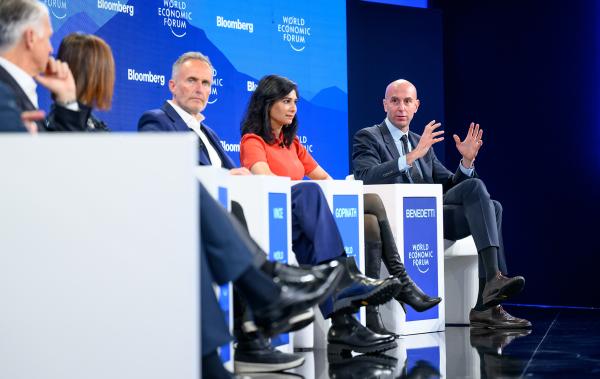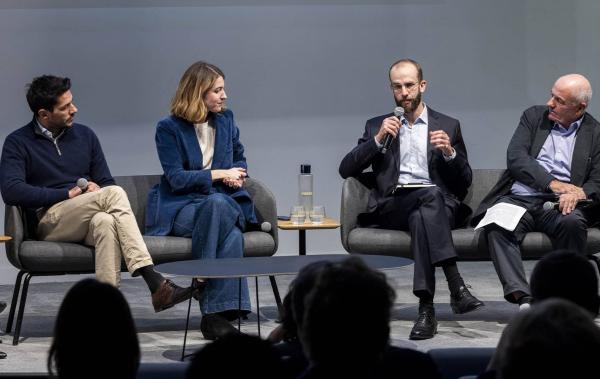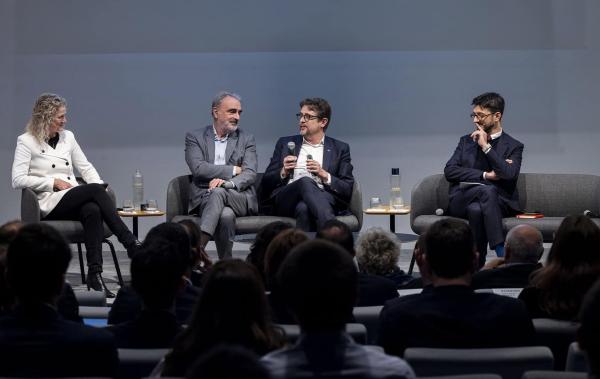Workplace experience in Sanofi’s new hub
Market watch
Workplace experience in Sanofi’s new hub
-
23 June 2021
-
Real Assets
-
Real Estate
Reading time: 15 minutes
Welcome to Entrepreneurial Journeys, a podcast from Ardian for anyone curious about where growth is happening around the world. Each week, we speak to the people behind innovative companies building the future. I’m your host, Portia Crowe.
If there is one thing the COVID-19 pandemic has shown us, it’s the importance of having good workspaces. Whether you love working remotely or can’t wait to spend more time in the office, it's important to be able to think and produce in a modern, sustainable, and innovative ecosystem.
Sanofi, the French multinational pharmaceutical company, gets that. That's why it chose a post-Haussmann style Paris office complex owned by Ardian for its new flagship location, opening next year. The more-than-9,000-square-meter building will serve as a global hub, where employees can work part of the time, while continuing to work part of their time from home. And it’ll have a state-of-the-art layout and design.
In this episode of Entrepreneurial Journeys, I speak to Julia Ghouti, Sanofi's workplace architect lead, about how the organization is embracing new ways of working, the importance of sustainability in architecture, and why Paris is an ideal city for a global company.
I started by asking her about Sanofi’s real estate strategy, and how physical space can influence work culture.
- Julia
The real estate strategy is for us to move towards a more modern, sustainable and collaborative work environment. And what we're trying to do is to get it all aligned with the new ways of working and the new culture we're trying to drive. So we're trying to promote more remote work. People are coming to the office for different reasons than before, and what they're trying to do when they come to the office is to collaborate, socialize and create.
Offices are often a reflection of organizations themselves.
- Julia
Our offices have a strong symbolic value in terms of who we are, who we stand for and what is important for us.
- Julia
We want to create a unique, memorable, positive experience that fosters innovation and well-being.
- Julia
When you come to the office, you want to have that wow experience, that sense of belonging, because that's when you actually get together with the meaning of your company and all the different values of that company.
- Julia
So for us, it's a real new energy that we're trying to share and a new start. It's a great opportunity to bring the new ways of working to life and modernize our work environment.
- Portia
What does that workplace experience mean exactly?
- Julia
So we're really trying to develop the new ways of working. So that is a real change in mindset. You don't work the same way you used to work when you were enclosed in your office with closed door and walls right around you. Here, when you actually come to the office, the idea is for you to be able to share with other people, meet other people, co create and work in a completely different manner. So we're looking to develop different atmospheres so you can have an area that's going to be dedicated to focused work, another area to a more vibrant, collaborative work, working in teams, in project mode and things like that.
- Julia
We're not going to assign people by desk, we’re going to try and free people from that obligation and have people assigned maybe to a floor with all sorts of possibilities for them to work from anywhere in the building.
Rather than having assigned desks, staff will have the freedom to move around and choose different work spaces based on their needs throughout the day.
- Julia
We really want these spaces to be living spaces, to be contemporary, sustainable and foster new ways of working. We've actually been implementing modern, agile workspaces since 2015 at a worldwide scale. And about 50 percent of our office space collaborators work in activity-based environments. But this new site in Paris will be a flagship for our company when it comes to new ways of working. And we're trying to push that agility, the flexibility, the creativity and innovation that bit further with this new site. So we really are looking for socialization, collaboration, innovation that are our drivers for developing this new site.
- Julia
The site will be organized around collaboration.The idea is for them to be able to choose, in fact, an environment that suits the way they want to work at that moment. So hopefully people will be moving around the building. You know, if they want that more relaxed opportunity to discuss the subject or to work in teams, then they will find that work café on the top floors, for instance.
Sanofi hasn’t always thought this way about space.
- Julia
Until 2015 at Sanofi, we had one desk, that suits all, sort of like a Swiss knife kind of desk where you did everything from that spot — we have different typologies of desk suited to different kinds of working. For example, we have sit-stand desks where you can adjust the height. So when you want to stretch your legs, you can actually stand in front of your desk. The whole of the work top comes, comes up. If you want to be working in a project mode or with a team, you can also be in a more vibrant, louder environment and you can be sitting quite close to other people and you can choose the people that you want to work with in that environment. And if you want to go to a more silent, more focused area, then you can choose to do so. So it gives you, you know, a whole list of possibilities of spaces to go and work. If you want to change your mindset and go and sit in another area, you can do that. You can go to a work cafe and sit there with your cup of tea and a slice of pie and have a relaxing moment where you're actually proofreading a document, for instance, or chatting with a colleague and working on a subject. So it just gives that more sense of freedom and flexibility.
COVID-19 has definitely changed things, but Sanofi had already been toying with flexible working arrangements since long before the pandemic.
- Julia
When the pandemic first started, everybody was a bit panicky about the projects that were ongoing because they thought we had to change what we would be the way we were thinking about projects. But this pandemic is, you know, a crisis moment. And I don't think we should be designing for a crisis — that's not a positive, constructive way of seeing things.
- Portia
But do you think that the pandemic has in some ways changed the way that we will work, going forward?
- Julia
Well, I think it helped managers that were still reticent to let people work from home. I think they've discovered that it's possible and that it doesn't stop people from working. And when people are working from home, they actually work that bit more than when they are at the office. I think managers used to be scared that people would, you know, be lazy and not do their work. But in fact, it's proven the opposite.
In terms of the layout inside the building, this will not be your typical office space.
- Julia
We definitely are looking for a very cozy, comfy, welcoming look and feel on the site, we would like there to be great coffee and to for it to be a visit for everybody to remember. So when we're going to come in, we're not going to have a traditional lobby. We would like it to be a very welcoming space. So we'll actually have a kind of coworking area there and an agile room at the back where we can have partners come and present things. So it's going to be quite an open lobby coworking experience when you come in. That's going to be very different from what we have today. Then when you are going to move up to the floors, you will come in to the general floor where you are going to be in the more vibrant, buzzy, lively space. You will have some lockers to put your things down in and then you could just choose from any space you want to work in. So depending on what your preferences are and what your work of the day you'll be able to identify where your work partners are. And then we have this very interesting space on the lower ground floor with the stairs that come down from the lobby facing the auditorium. And then we have a very interesting face to face in between the auditorium and those living stairs, we call them for the minute.
The flagship location will serve as a global hub — for Paris-based employees, but also for other staff and executives passing through town. And Sanofi plans to continue with its hybrid-flexible working model, where employees can split their time between working remotely or from the office.
- Julia
The fact that people can work from home means that maybe they're organizing their days to have those phone conversations or that focus work from home when they can and coming to the office to meet and work together with people. So the actual space that people need in the office is different than what they used to need. It's more about collaboration and being together when you are in the office and less individual focused work in the office.
- Julia
What we think is that people will keep working from home for several days a week or per month, maybe keeping those opportunities to do the focus work they need to do and some zoom meetings, and then keep the more collaborative moments for when they are together with other people in the office.
- Julia
I think a happy Sanofi worker is somebody that is able to concentrate better and work better for the company as well.
Sanofi is also leasing a building from Ardian in Berlin. Both it and the Paris location were selected, in large part, because of their international sustainability certifications.
- Julia
We were looking for sustainability, so that's a very important issue. They are well located with easy access for public and green transport. And we're looking for a venue that will foster well-being for all — so space, good lights, attractiveness, and contemporary style. And we also want our buildings to be very functional, which is an important issue for us.
There are lots of ways a building can be made sustainable.
- Julia
For instance, Ardian is changing all the windows on the building. They're changing all the technical aspects as well of that building. And we're even pushing that a bit further. We are, instead of having a gas fueled heating system, we're actually going to try and connect the building to a common source of heat. So we're going to actually have the centralized heating system that's linked to the town. So those are all sustainable issues as well. Ardian did something that was quite impressive about the building, is that they broke open the floors that were designed for the parking lots and they've reduced the number of parking spaces to a very little number to create more positive light, usable space in the building. So I think that's a very interesting position from Ardian to have that in mind and to create more collective shared space rather than creating more parking lots.
The Paris building is located at 46-48 Avenue de la Grande Armée, which Ghouti said is ideal for a number of reasons.
- Julia
Being in between the Porte Maillot and the Place de l'Etoile, very, very close to the Defense business district, is a real business hub there. And it has excellent connectivity by car, by train, metro, bus, bicycles. And even for people flying into Paris by plane, it's very fast to get to the two major airports in the area. We're delighted to have an exceptional rooftop on the building, which is going to offer a unique Paris experience with views towards the Eiffel Tower on one side and the Sacré Coeur on the other.
- Portia
Does the company feel rooted in its Parisian heritage?
- Julia
Well, we're an international company with a strong French heritage, and we're proud to be in Paris because Paris is a wonderful city for a global company hub.
The flagship hub will house between 450 and 500 people, with extra space for anyone coming in from outside the Paris region to work.
- Julia
So it's not just our new central headquarters. We don't actually want to call it our new headquarters. We're looking for another name. And we want it to be, you know, everybody, every Sanofi worker’s office in Paris, including our partners’ office, you know, we want it to be very open and shared.
- Julia
We don't want it to be exclusive. It's, you know, it's for everybody. It's our hub. It's where we want people to enjoy coming to see, you know, what's happening in the company, it's a real space where we want to foster interaction, creativity and innovation.
- Portia
Some people would claim that the office is dead. Do you share that idea?
- Julia
I honestly don't think that the office is dead. You know, the pandemic in some ways was showing us that the office can't be dead, because that's where you get the whole feel of what the company energy is. I mean, I have meetings all day long with different countries, different offices around the world, and nothing can come close to having a cup of coffee with somebody and discussing a business issue informally and meeting the people by chance, which instead of sending an email, for instance, meeting them, at the coffee table or at a coffee meeting or something, just makes that difference in the exchange you have with people, because it's informal, but it's very efficient. And I think us, as human beings, need that contact and that real physical experience of actually meeting someone in person.
- Julia
I think it's positive for everybody.
Thanks for tuning into Entrepreneurial Journeys, a podcast from Ardian. Listen on Apple Podcasts, Spotify, Deezer, or wherever you get your podcasts. If you liked this episode, don’t hesitate to leave a comment on Apple Podcasts and talk about it with your friends and colleagues.
Read the transcript Hide transcript
In this episode of Entrepreneurial Journeys, we speak to Julia Ghouti, Sanofi's workplace Architect Lead about how the organization is embracing new ways of working, the importance of sustainability in architecture, and why Paris is an ideal city for a global company.
If there is one thing the COVID-19 pandemic has shown us, it’s the importance of having high quality workspaces. Whether you love working remotely or can’t wait to spend more time in the office, it's important to be able to think and produce in a modern, sustainable, and innovative ecosystem.
Sanofi, the multinational pharmaceutical company with its headquarters in Paris, understands that. That's why it chose a post-Haussmann style Paris office complex owned by Ardian for its new flagship location, opening next year. The more-than-9,000-square-meter building will serve as a global hub for employees. The building will have a state-of-the-art layout and design.
In this episode of Entrepreneurial Journeys, we speak to Julia Ghouti, Sanofi's workplace Architect Lead, about Sanofi’s real estate strategy and how physical space can influence corporate culture.
I honestly don't think that the office is dead. When you come to the office, you want to have that positive experience and to feel that sense of belonging, because that's where you really catch the energy of your company and all of its values. Our offices have a strong symbolic value in terms of who we are, what we stand for and what is important for us.
Entrepreneurial Journeys is a podcast for anyone curious about where growth is happening around the world. Here, we speak with the people behind innovative companies building the future. They are entrepreneurs from across Europe, working in technology, healthcare, mobility, education, and more.
We'll hear about their greatest successes and challenges, how they weathered the pandemic, and where their industries are going next.
This podcast is hosted by Portia Crowe and produced by Louie Creative for Ardian.
Tune in on Apple Podcasts, Deezer, Spotify, or wherever you get your podcasts - and join us for an inside look at where the world is going next.
Our podcasts are accessible to all thanks to the written transcriptions of the episodes available on our website on each episode's landing page.




